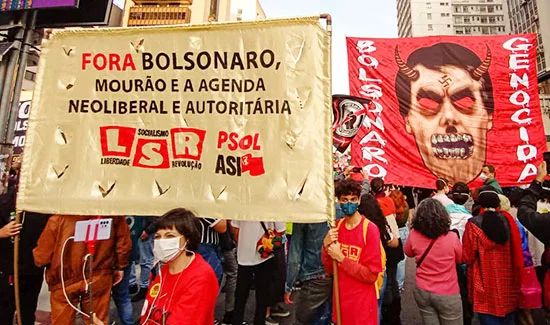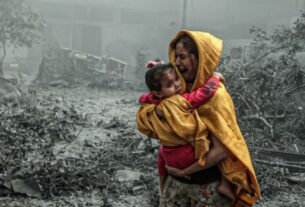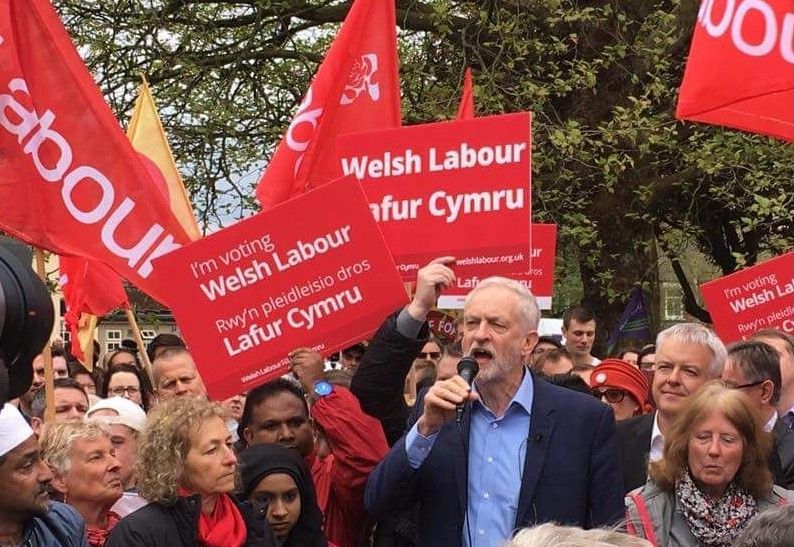Pedro Meade is a member of Liberdade, Socialismo e Revolução (ISA in Brazil).
As we know, the consequences of the climate catastrophe will affect everyone, but it is poorer and working-class communities, particularly in poorer countries, that will bear the brunt of this disastrous situation. This is a fundamental feature of modern imperialism where major world capitalist powers fight over dwindling resources with little to no regard for human life or the planet.
To maintain a constant flow of profits they must also maintain a system of power and influence by exploiting entire countries and continents and oppressing their populations. Today with world inter-imperialist relations increasingly dominated by a new cold war between Chinese capitalism and the US we must look at how imperialist exploitation and oppression has accelerated the climate and environmental crises whilst at the same time leaving the working class and oppressed people to face the consequences.
In the 2018 Brazilian election campaign, Jair Bolsonaro, then still just a candidate, stated “If I become President there will not be a centimeter more of indigenous land”. It wasn’t the first nor the last time that he would say something similar and since becoming president he has thrown his weight behind reducing the demarcation of Indigenous and other traditional communities’ lands to a standstill, whilst encouraging violent invasions into these lands by logging, mining and land-grabbing companies.
Imperialist Plunder
He states that the reason that these communities don’t deserve to have their own land under their control is that they “hinder progress” and that the supposed wealth of minerals and other resources found on these lands are “going to waste”. Of course, what he means by “progress” is opening them up to foreign businesses to exploit and export whatever they might find there, ignoring the fact that indigenous territories are the best-preserved islands of healthier ecosystems in a sea of deforestation and destruction.
This is not new in Latin America and indeed in most of the countries in the “global south” (commonly used term for countries which have suffered underdevelopment due to imperialist domination). Since the rise of colonialism, for centuries the local ruling class have done all they can to accommodate multinationals or imperialist powers to be able to extract resources with cheap or slave labour. However, this process is now intensifying, as resources become more and more scarce, and competition between imperialist powers intensifies.
In Africa, Chinese mining operations have challenged the dominance of North American and European companies, with heavy investment in countries such as Zambia and Democratic Republic of the Congo to secure sources of copper, lithium and cobalt. These investments rarely reach the local population, however, which suffers from a lack of infrastructure and terrible working conditions, sometimes utilizing child labour.
Gyekye Tanoh, the head of the Political Economy Unit of the Third World Network-Africa based in Ghana, recently released Bank of Ghana data which shows that, “of the $5.2 billion worth of gold exported by foreign-owned mining interests from Ghana [from 1990 to 2002], the government received only $68.6 million [in] royalty payments and $18.7 million in corporate income taxes. In other words, the government received a total of less than a 1.7% share of the global returns from its own gold.”The gold industry is in itself a symbol of capitalism’s waste of resources and environmental destruction. Today, up to 80 per cent of the gold that is newly mined or recycled is used for jewelry manufacturing, something that in reality has little or no use value.
Mining, Logging and Land-grabbing Accelerate Climate Destruction
Mining always has a more or less devastating effect on the environment, with the obvious destruction caused by the actual digging process enhanced by the poisoning of water supplies by toxic runoff. This is amplified even more by accidents, something that is becoming more common with state owned extraction companies being sold off and private companies worsening safety standards. The results of this were seen in 2019 when a tailings dam in Brumadinho in Brazil collapsed, releasing 12 million cubic metres of toxic mud that killed 270 workers and local residents and poisoned the surrounding rivers destroying delicate and unique ecosystems and taking away the livelihoods of local fishermen.
Along with mining, logging and land grabbing destroy huge areas of forests and ecosystems. The massive forest fires seen across Latin America during the dry seasons are actually usually part of the last stages of “cleaning” areas which are to be illegally claimed. The last few years have continuously broken records for the scale and duration of these fires. Sometimes, fires are set deliberately in conservation areas with the simple and brutal logic that after the fires have destroyed every unique example of biodiversity, then there is no reason to preserve the area any longer and the authorities can sell them off. This land is then used for huge monoculture plantations of soybeans and other such crops or massive cattle ranches for the meat and dairy industries all of which are mainly exported. This leads to the situation of countries producing and exporting huge quantities of food at the same time as hunger is becoming more widespread.
The resistance to this greenwashing is growing. International Socialist Alternative in Sweden (Rättvisepartiet Socialisterna) has been part of the growing protests from Indigenous groups from the Sami People, the local community and environmental groups.
The Amazon — a Key Battleground
The Amazon rainforest has become a key battleground for different imperialist interests. The US has for a long time had a vested interest in its ecosystem, not only because of its resources but also because of its strategic importance. Since the fires, other countries such as France have used an environmentally friendly veneer to threaten intervention in the area, leading the US to straighten its ties with local governments and even sending the ex-secretary of state Mike Pompeio to visit.
The levelling of these forests has other consequences, apart from the destruction of the wildlife and local Indigenous communities. Parts of the Amazon now produce more CO2 than it absorbs because of the fires and human activity there. Also, there is a direct impact on the availability of freshwater, as the “giant aerial rivers” made up of water vapor released into the atmosphere by the trees which are drying up, leads to a reduction in rainfall in other parts of the region as well as the world. Droughts are becoming more common, leading to a scarcity of both water and food production, particularly in Africa and Latin America. Brazil and Argentina are facing massive droughts with the reservoirs in the southern states of Brazil drying up and leading to the very real possibility of blackouts as most of the country’s energy is produced by hydroelectric power stations.
New Water Wars?
We are already seeing conflicts over water rights both on a local level and on a larger scale. Communities have had to fight for access to water, which has usually been stolen by private companies. This led to an uprising of poor farmers in the “War for Water” against water privatisation in Cochabamba in Bolivia at the beginning of the 2000s, part of a revolutionary wave in the country. But we are also seeing the state and private sector working together to secure fresh water supplies before competitors do.
With most of the world’s freshwater originating in mountain glaciers, which are now melting at faster rates, there is a race to secure these “water towers”. An important reason for the continued occupation of the Tibetan plateau by China is to secure these supplies, which is part of the dramatically heightened border conflict with India.
Of course this scramble to secure water is not for the wellbeing of the billions of people that are still going without it, but to ensure a steady supply for industry and large scale farming. A recent WHO and Unicef report estimated that in 2020 46% of people worldwide still didn’t have access to safely managed sanitation services and one in four people lacked safely processed drinking water in their homes. In most countries of the “global south”, this is the reality in many of the favelas and shanty towns that have always faced this lack of infrastructure. This is particularly the case for people of colour and women, who more often live and work in these areas, leading to increasing health issues and disease as we have seen during the ongoing pandemic.
LSR members in the waterworks union have also led the struggle against the privatisation of water companies, something that is particularly important as the southwest region faces its worst drought for 92 years.
The Poorest Bear the Consequences
It is these communities that face the consequences of the imperialist plundering. Not only do they not see the billions made from extracting resources, but they also face the onslaught of wage cuts, the erosion of rights and privatisation of infrastructure. The pandemic revealed the extent of these attacks, particularly in the health sector, but also in sanitation and education, which in many places were simply unable to cope with the crises. Women, and especially women of colour, face the worst consequences. They are disproportionately hit by job losses, and are also more exposed to illness due to being the main provider of care for families. Food insecurity coupled with the widespread use of pesticides, many of which are banned in the EU and US, only increase health issues as well as the air pollution in many of the megacities.
The selling off and cutting of costs of infrastructure also means that these communities will have a much tougher time dealing with ever-increasing extreme weather events and will take longer to recover each time a catastrophe happens. Countries like Haiti are being battered from stronger and more frequent tropical storms but lack the resources to deal with the consequences after centuries of imperialist plundering.
It is not surprising that these communities are therefore at the forefront of the fightback against this devastation, particularly women. In 2019, as part of an explosion of struggles around the world, Indigenous movements in Ecuador led the fight against neoliberal policies. In Chile and more recently in Colombia, youth, with young women to the fore, rose up against attacks and governments with a long history of US support. It was the Indigenous workers’ movement in Bolivia, striking and using roadblocks that managed to revert the US backed coup in the country in 2020, and right now Indigenous women in Brazil are at the forefront against Bolsonaro’s attacks on their rights, the environment and their lands.
These examples, as well as the huge Indian farmers strikes against the Modi government’s attempt to reduce regulations and open up the market to big business, and the 2020 Indonesian national strike against attacks on the working class and environmental protections, point the way forward: resisting the capitalist and imperialist profiteering that is devastating the world. The new cold war between China and the US will have wide implications not only for geopolitics, but also for the environment and their struggle for supremacy will be paid for by the destruction of the world’s ecosystems and the lives of poor and working-class people. We must ensure that the climate struggle is also a struggle against oppression and exploitation. It is the only way that we will be able to defeat imperialism and finally destroy this barbaric system, replacing it with a sustainable socialism free from exploitation and oppression.




